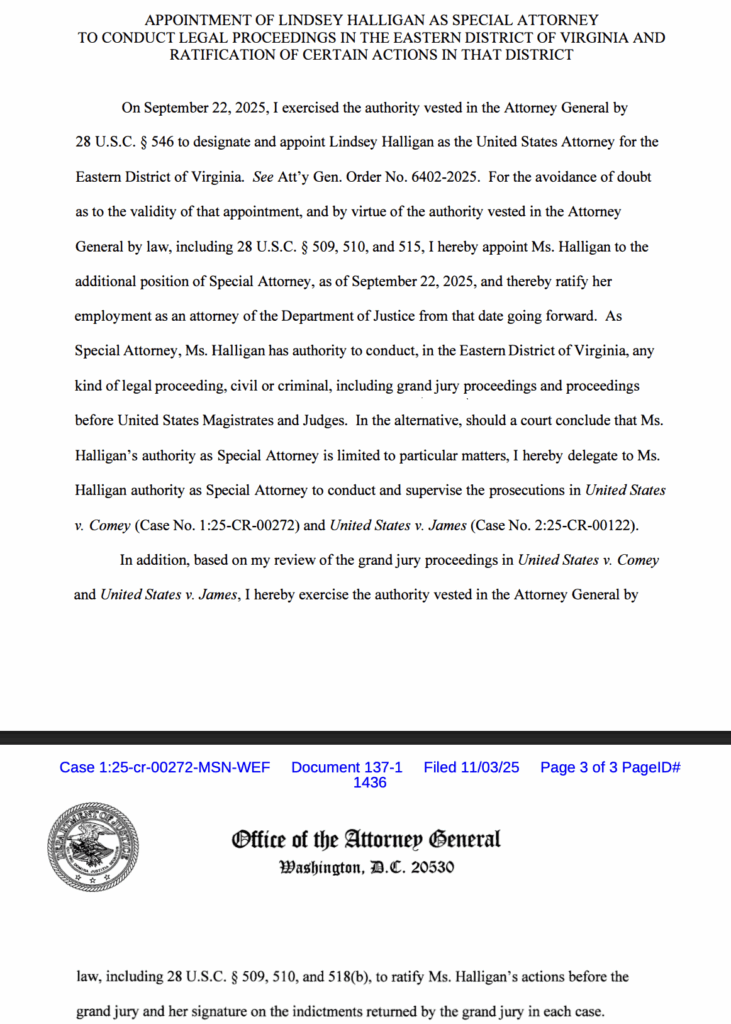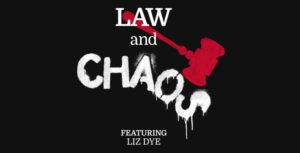
On Thursday, Donald Trump’s insurance lawyer, Lindsey Halligan, will defend her right to lead the US Attorney’s Office in the Eastern District of Virginia. It will likely be one of her last acts on the job. The only real question is whether she’ll take the James Comey and Letitia James indictments with her, or whether they’ll limp on a bit longer under some other prosecutorial authority.
The Three Hat Dance
Attorney General Pam Bondi certainly knows how to hand a US Attorney’s Office over to one of Trump’s cronies. Since July, she’s been using the same maneuver to install unconfirmable MAGA dolts to the top prosecutor’s job:

How LexisNexis State Net Uses Gen AI To Tame Gov’t Data
Its new features transform how you can track and analyze the more than 200,000 bills, regulations, and other measures set to be introduced this year.
- Step 1: Appoint crony as interim US Attorney for 120 days under 28 USC § 546.
- Step 2: When it becomes clear that no Senate confirmation is coming, appoint said crony as first assistant US Attorney, and then claim that crony is automatically promoted to acting US Attorney by operation of the Federal Vacancies Reform Act.
- Step 3: Simultaneously appoint crony as a special attorney under 28 USC § 509, 510, and 515.
It’s a little rickety, but it’s more or less worked, so far — at least to the extent that the cronies have still been able to charge cases. Three federal courts ruled that Steps 1 and 2 aren’t legal, since they would effectively eliminate Senate confirmation for US Attorneys. Why would any president bother nominating someone when he can string together an endless string of interim appointments, potentially of the same crony? But no judge has dismissed a case based on the US Attorney’s unlawful appointment, since Assistant US Attorneys who do the actual work of charging cases have the power to indict and prosecute as well.
But on September 22, Pam Bondi only slapped the first hat on Lindsey Halligan, appointing her interim US Attorney under § 546. That was tempting fate, since a federal judge in Pennsylvania had already ruled that § 546 only allows for one 120-day interim appointment, after which only the district’s judges may appoint an interim lead prosecutor until the Senate confirms a pending nominee. And it was doubly tempting fate since Halligan was the only lawyer at EDVA who would get anywhere near the Comey and James cases.
Halligan was the sole lawyer to present those indictments to a grand jury, and she’s the only one who signed them. So if she wasn’t legally appointed, those cases would appear to be DOA.

5 Tips For Proving Your Legal Department’s Value
Join our expert panel on March 3rd at 1pm ET to explore actionable, emerging ways you can gather and proactively share the data that demonstrates the impact of your work.
Hot Tub Time Machine DOJ
Pam Bondi is currently trying to do the three-hat dance in reverse. After Comey and James filed motions to dismiss noting that three courts have found that the president cannot make successive interim appointments, Bondi signed a new order purporting to retroactively designate Halligan as a special attorney under §§ 509, 510, and 515 “as of September 22” — effectively traveling back in time six weeks and sticking the third hat on Halligan before she secured the indictments.

Alternatively, Bondi claimed to have “ratified” the indictments, blessing them post facto and curing any defect arising from the unfortunate technicality that Halligan had no right to be in the grand jury room.
After Pat Fitzgerald and Abbe Lowell spent ten solid minutes laughing their asses off — PRESUMABLY! — they filed their replies.
Lipstick on a pig
“Attorney General Bondi does not have a time machine,” James’s lawyers jeered, adding that “Just as President Trump could not announce tomorrow that he is ‘appointing’ Attorney General Bondi as the acting Administrator of NASA from January 2025 to March 2025, Attorney General Bondi lacked the power announce an appointment of Ms. Halligan that bent space and time.”
They were similarly derisive about the government’s claim that Halligan was functionally an AUSA in September, rather than a White House aide tasked with de-woke-ing the Smithsonian: “The problem is that Ms. Halligan brought this indictment as a private citizen with no authority to litigate on behalf of the United States. No amount of ex-post maneuvering can rescue this unlawful indictment from dismissal.”
James calls dismissal with prejudice “the only remedy that will promote the interests protected by the Appointments Clause and deter the government from deploying unlawful appointments to effectuate retaliation against perceived political opponents” — essentially tying it into her motion to dismiss for selective and vindictive prosecution.
Comey’s reply echoes James’s, scoffing at Bondi’s reliance on a theory of § 546 that has already been rejected by three courts. But his argument against Bondi’s “ratification” and for dismissal with prejudice is even stronger than James’s, since the statute of limitations on his “crimes” has now expired.
Comey quotes the Supreme Court’s holding in FEC v. NRA Political Victory Fund, finding it “essential that the party ratifying should be able not merely to do the act ratified at the time the act was done, but also at the time the ratification was made.” Bondi could not indict him today because the statute of limitations has run, and so she can’t retroactively ratify an indictment that was improperly obtained six weeks ago.
Something to remember you by
This morning Judge Cameron McGowan Currie will consider the motions to disqualify Halligan and dismiss the indictments. We may also get an indication of how egregiously inappropriate Halligan’s grand jury presentations were, since the court has been mulling them over for more than a week.
Judge Currie, who was seconded from the District Court of South Carolina to hear the disqualification motion, ordered the government to turn grand jury transcripts in both cases for in camera review. In the Comey case, she later filed a second order noting that the government’s production “fails to include remarks made by the indictment signer both before and after the testimony of the sole witness, which remarks were referenced by the indictment signer during the witness’s testimony.” Halligan also forgot to include information on the first indictment, for which she got no-billed.
So, things are not looking great for the “indictment signer.” And that’s before she has to defend these fakakta cases on the merits! But, even if she does get get tossed off this case tomorrow or next week, Halligan will take a souvenir with her — something to remember this day by. And that something is … a bar complaint.
On Tuesday, the Campaign for Accountability notified the Florida and Virginia bars of potential violations of their respective rules of professional conduct. The nonprofit suggests that Halligan: violated her obligations of candor and competence; made extrajudicial statements; brought a prosecution she knows is not supported by probable cause; and engaged in conduct involving dishonesty, deceit, misrepresentation, or conduct prejudicial to the administration of justice.
So, whatever happens, she’s got that to look forward to.
Subscribe to read more at Law and Chaos….
Liz Dye produces the Law and Chaos Substack and podcast. You can subscribe by clicking the logo:
